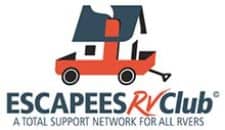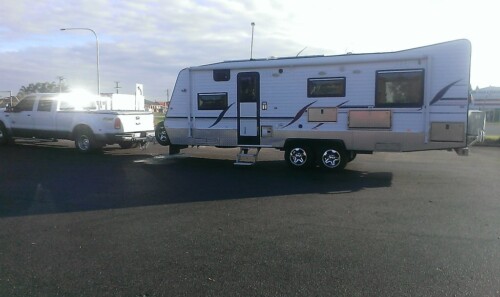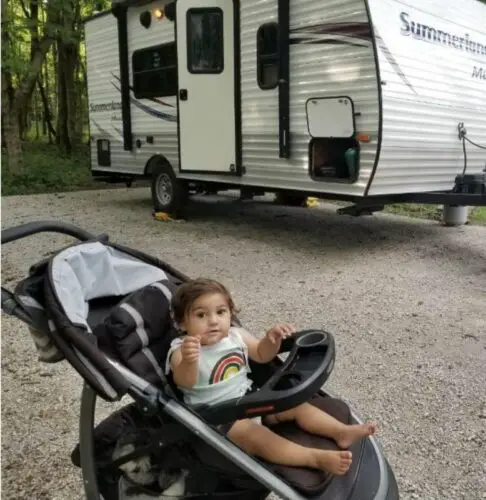With the weather turning pleasant, there’s only one thing on everyone’s mind: a family getaway! But with fed hiking up interest rates and inflation skyrocketing, there’s only so much you can do without emptying your pockets.
Well, there may be a way around this problem. You can simply take your RV and go camping with your family for an enjoyable getaway! Yes, even if you have kids or babies!
Can you manage a cheap weekend retreat with your RV?
Let’s find out!
RV VACATION: TO RENT, BORROW, OR BUY?
It ((almost) goes without saying that renting is the way to go if you don’t own an RV. Unless you have a large family or are looking for the latest model, a ten- to fifteen-year-old model Class B van or Class C RV should do the job. It will cost you around $100 to $150, which should be affordable given you are not going for an extra-long vacation.
Generally, you cannot rent a travel trailer or 5th wheel (or any towable RV) unless A) you’re towing with your own vehicle and B) you rent from a peer-to-peer network like RVEzy or Outdoorsy. Here are some good tips if you want to rent an RV and not pay for any mistakes!
However, if you own an RV, congratulations! You don’t have to pay the rent translating to some major savings! (If you take a two-week vacation, you save up approximately ($100 x 14 = $1,400).
HOW MUCH DO RV SITE RESERVATIONS COST?
Of course, if you are going to park an RV in an RV park, you will have to pay the parking fee. On average, you can expect to pay around $35 to $50 per night for basic parking. However, overnight prices can go as high as $100 at luxury RV resorts!
A few factors come into play to determine the final cost.
- Location: A centralized location near tourist spots tends to cost more.
- Amenities: Water, electric, and gas hookups, as well as shower and restroom facilities, swell the reservation fee. Partial Hookup (PHU) sites with water and electricity are generally 40% less expensive than Full Hookup (FHU) sites with site sewer. (Also, some PHU sites share a water spigot with other sites).
- Time of the year: Prices increase during the tourist season (spring, summer, and early autumn) because of increased demand. Prices decrease if you rent by the week or the month, though.
Another great advantage of RV camping is that you can actually find spots that you don’t have to pay for. These include the following:
- Walmart Parking Lots: You can check which Walmarts allow overnight parking and save up the dollars!
- Public land: If you’re in the western U.S., check out BLM land for a lifetime’s worth of free camping! If you’re in the East, options are more limited, but look into rules for state game lands and U.S. National Forest dispersed camping areas.
- Truck Stops: Several trucks stops also allow free parking for RVs. Looking to stay for a couple of hours and be on your way? This is a perfect option!
- Churches: Many churches allow RV parking overnight free of charge. Just run a quick search on the internet and see which one is the nearest to you!
- Couchsurfing. Affectionately known as “moochdocking,” it’s a great way to explore the country (or someone’s yard) for free!
Pro-tip: Many of these spots won’t have proper amenities, so make sure you are stocked up on the essentials!
Pro tip: RV traveling has exploded post-COVID. If you want to get a site in a popular area, you might need to reserve 2-6 months in advance!
HOW MUCH CAN YOU SAVE COMPARED TO AIRFARE?
On average, a domestic return fare costs $330, depending, of course, on the distance of your vacation spot. While it’s true that gas prices have skyrocketed in recent months, it is still cheaper to travel by road. Let’s do some quick math to compare:
| Average gas price in the US | $5/gallon |
| Average of a Class B or Class C RV | 10 miles per gallon |
| Miles traveled | 2,000 |
| Total Cost | $1,000 |
As you can see, even with rising gas prices, traveling with your RV is significantly cheaper over short-to-medium distances. This is especially true if you have a large family of 5 to 6 people.
Pro tip: Just make sure you’re paying a flat overnight fee for your RV rental! Mileage fees can really kill the overall cost.
RVS VS LODGING: A QUICK COST COMPARISON
Hotels
According to statistics, the average hotel room costs between $90 to $160 per night, depending on the location and inflation. Big cities like New York and Los Angeles have a higher cost per room than remote areas, especially during the vacation season. With a big family, the cost can quickly multiply as many hotels limit the number of occupants in one room.
Airbnb
Airbnb has taken the world by storm for all the right reasons! You can rent a house on an Airbnb (with multiple rooms) for approximately the same price (around $160 per night) as booking one hotel room! If you are still deciding on the perfect vacation, you can search states with cheaper Airbnb options.
These include
- Ohio – $147/night.
- Nebraska – $119/night.
- Illinois – $139/night.
- Kansas – $118/night.
But is this the right option to pick when compared to RVs?
RV
So, how does an RV measure up to hotel costs and Airbnb rents? Well, on the face of it, there is no cost! You can simply squeeze in as many people as you want without paying anything. If you are parked at an RV parking lot, you may have to pay a guest fee of $10 to $20 for every additional person. But as you can see, it is nothing when compared to living in a hotel or an Airbnb home!
HELPFUL TIPS ON SAVING MONEY ON AN RV FAMILY GEATAWY
Save on Groceries While Traveling in an RV
Another major expense in any getaway is the outrageous amount of money spent on food. This includes dining at an expensive restaurant with a fancy ambiance or ordering from room service and paying exorbitant bills. On average, a tourist in the US spends $18 on a meal when dining out.
Now if you have a family of 5, your average bill for a meal would be approximately $100. On the other hand, if you use the same $100 to buy groceries and ingredients to cook yourself, you’ll be doing yourself a favor in terms of saving a lot of money.
Not only this, but you can also eat healthier and bond over food, which becomes very difficult in a restaurant setting.
Here’s a picture of a BBQ that my family and I enjoyed on a cold night. Can anything get better than this?
Fun fact: My friend’s family and my family went on a vacation at the same time. Only they decided to eat out and we decided to cook our own food in the RV. Can you guess who came out on top on saving money? Yes, it was us! We saved a whopping $550 compared to them.
Now they might have eaten out at expensive places a few times, but you get the idea. The stats never lie.
With that said, here are a few tips to save money on food through an RV vacation.
- Buy in Bulk: You can search online stores, access discount stores, or go for wholesalers like Costco to buy in bulk. This way, you can significantly save up on your on-food costs.
- Cook Yourself: Get a cheap portable propane stove (that runs off 1-lb propane canisters) and cook your food either inside or outside, depending on your location.
- Eat light: Always go for easily digestible, healthy items that are tasty and fulfilling rather than going for elaborate meals that can ruin your vacation and tether you to a toilet.
Save on Pet-Sitting Costs
It’s a hassle (and often very costly) to take your pet on vacation with you. But if you are taking your RV, you can easily make some space for your furry friends! Here are a few side benefits of having your pet by your side while on the road.
- Avoid Kennel Costs: On average, a kennel charges $150 per week. If you are going for a couple of weeks, you are looking at a handsome outflow of money! Comparatively, an RV park will charge a very low daily fee for your pet, typically around $1 to $10.
- Skip Additional Airfare Cost: You need to pay $100 to $150 as a fee and buy a specialized carrier that costs around $250.
- Have great company: We understand how sensitive people are to their pets. It is always good to have them with you on your vacations. They deserve it!
Avoid Paying Extra for Luggage
One question that keeps people up at night before their vacation is what to fit in one tiny suitcase. You can take only so much stuff with you if you are flying. Airlines are notorious for charging exorbitant amounts even on one extra pound of baggage.
On the other hand, you can throw in whatever you like in your RV. You have a lot of space compared to just one suitcase, and you can take a lot of extra stuff that you may need to enjoy your vacation to the fullest.
***
Our verdict? RV camping is a good and cheap option for a family getaway, especially nowadays, where RVing has become common. Playing it smart and planning allows you to save a lot on hotel costs, airfares, and restaurant bills. If you’ve been thinking about going on an RV vacation with your family, now is the right time.
Usama is a freelance SEO writer and a travel enthusiast. When not writing, Usama can be found reading a good book or munching on some sandwiches.
-
Usama Khanhttps://changingears.com/author/usama-khan/
-
Usama Khanhttps://changingears.com/author/usama-khan/
-
Usama Khanhttps://changingears.com/author/usama-khan/
-
Usama Khanhttps://changingears.com/author/usama-khan/










